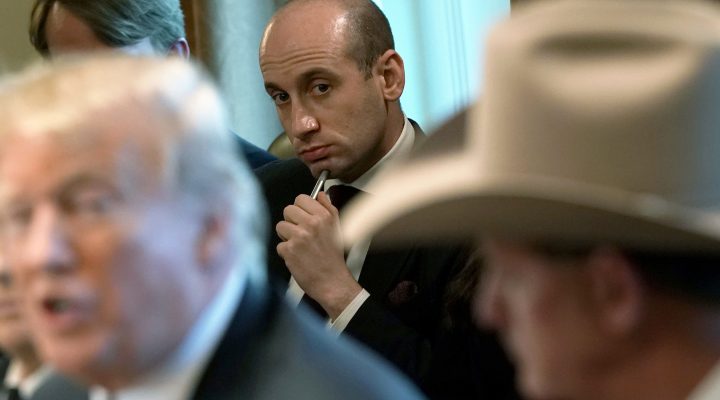Filmmaker Errol Morris is known for his probing documentaries. His breakout film The Thin Blue Line (1988) investigated the framing of an innocent man by a corrupt police force. In 2003, Morris won the Oscar for his film The Fog of War, an indepth look at former U.S. Secretary of Defense Robert McNamara and the quagmire of U.S. military intervention in Vietnam.
Now, Morris has turned his investigative lens on the Trump administration’s “zero-tolerance” border enforcement policy that separated immigrant families and put children in cages. His film, Separated, weaves together interviews with administration officials, government emails and re-enactments for a forensic look at the Trump administration’s child separation policy, and how it could happen again if Trump is elected again.

Director Errol Morris (R) and U.S. journalist Jacob Soboroff attend a screening of “Separated” during the 81st International Venice Film Festival at Venice Lido, on August 29, 2024. (Photo by MARCO BERTORELLO/AFP via Getty Images)
Trump kicked off his 2016 presidential campaign railing against illegal immigrants, whom he accused of bringing drugs and crime to America. While these accusations are false and abhorrent, Trump’s anti-immigrant rhetoric was well received at his rallies. Campaign adviser and future administration official Stephen Miller was largely responsible for this xenophobic and nativist platform, which amplified Trump’s own racist views.
Started on day one
Once Trump was elected, the administration, with Miller ‘s guidance, began implementing anti-immigration policies right out of the gate, including the “Muslim travel ban,” the end of Deferred Action for Childhood Arrivals program, and pilot programs for border enforcement in El Paso, Texas, and Yuma, Ariz., which included child separation.
“What amazed me is that separation started almost as soon as (Trump) assumed the presidency,” Morris said in an interview with Variety. “They were separating families from the very, very, very, very beginning, and denying it, denying that they were doing it, because they realized that these policies were wrong or embarrassing or politically problematic.”
Under orders from the Department of Homeland Security, border officials in El Paso detained and criminally charged parents who crossed the border illegally. This was true even if it was their first border crossing violation (formerly a misdemeanor), and even if migrants arrived at official ports of entry. Customs and Border Protection officers seized any young children who came with their parents, reclassified them as “unaccompanied,” and sent them to one of the hundred Office of Refugee Resettlement shelters around the country.
The government had no plan in place to reunite these children with their parents.
“They created a situation where the records are paltry or nonexistent,” Morris said. “At the heart of this film is not so much a migrant story, but a story of a bureaucracy and an administration.”
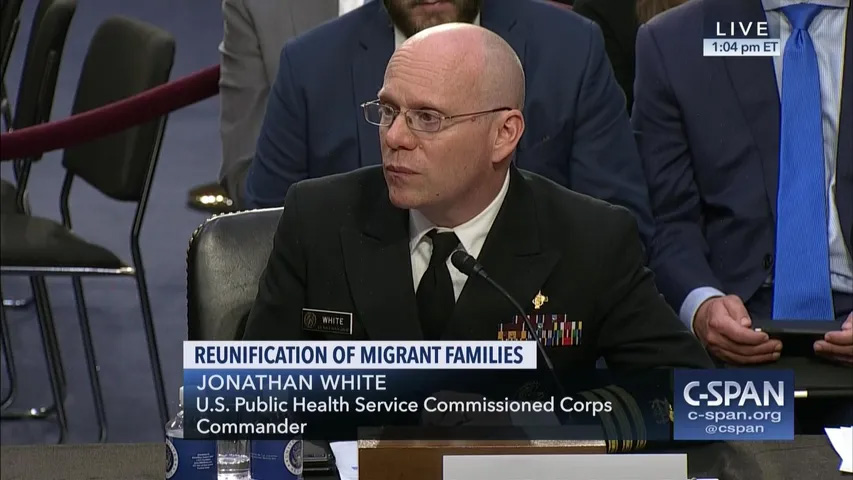
Jonathan White testfies in 2018 about the ill effects of the Trump administration’s family separation policy. (Screencap from CSPAN)
Testimony from a career official
Jonathan White was one of the few government officials willing to be interviewed in Separated about the child separation policy.
“The Unaccompanied Children program, which I worked in, was essentially hijacked for a purpose for which it was never intended nor authorized in law,” he explains. A career officer in the U.S. Public Health Service Commissioned Corps and an expert in childhood trauma, White was appointed deputy director of the ORR before Trump took office. Unaware the pilot program already was up and running, he warned the Trump administration that separating families would cause psychological harm to children and that the ORR shelters could not accommodate an influx of young children.
Trump and his advisers ignored White’s report.
“Harm to children was part of the point. They believed it would terrify families into not coming.”
“Harm to children was part of the point,” he says. “They believed it would terrify families into not coming.”
After interviewing White for his documentary, Morris believes the motivation behind the policy was simpler. “They’ll say it’s for the purpose of deterrence: ‘We’re going to send a signal to people in Central America who might be thinking of making the trek north to the Mexico/U.S. border. And this will tell them what they’re facing if they choose to make the trip and choose to cross the border.’ I don’t even believe that. I believe there’s some deep satisfaction that comes from just plain garden variety meanness and cruelty. Is this fascism in some form, if fascism is demonizing other people? Well, yes, it is.”
White left the ORR in March 2018, and two months later the administration went forward with the plan to separate families at the border.
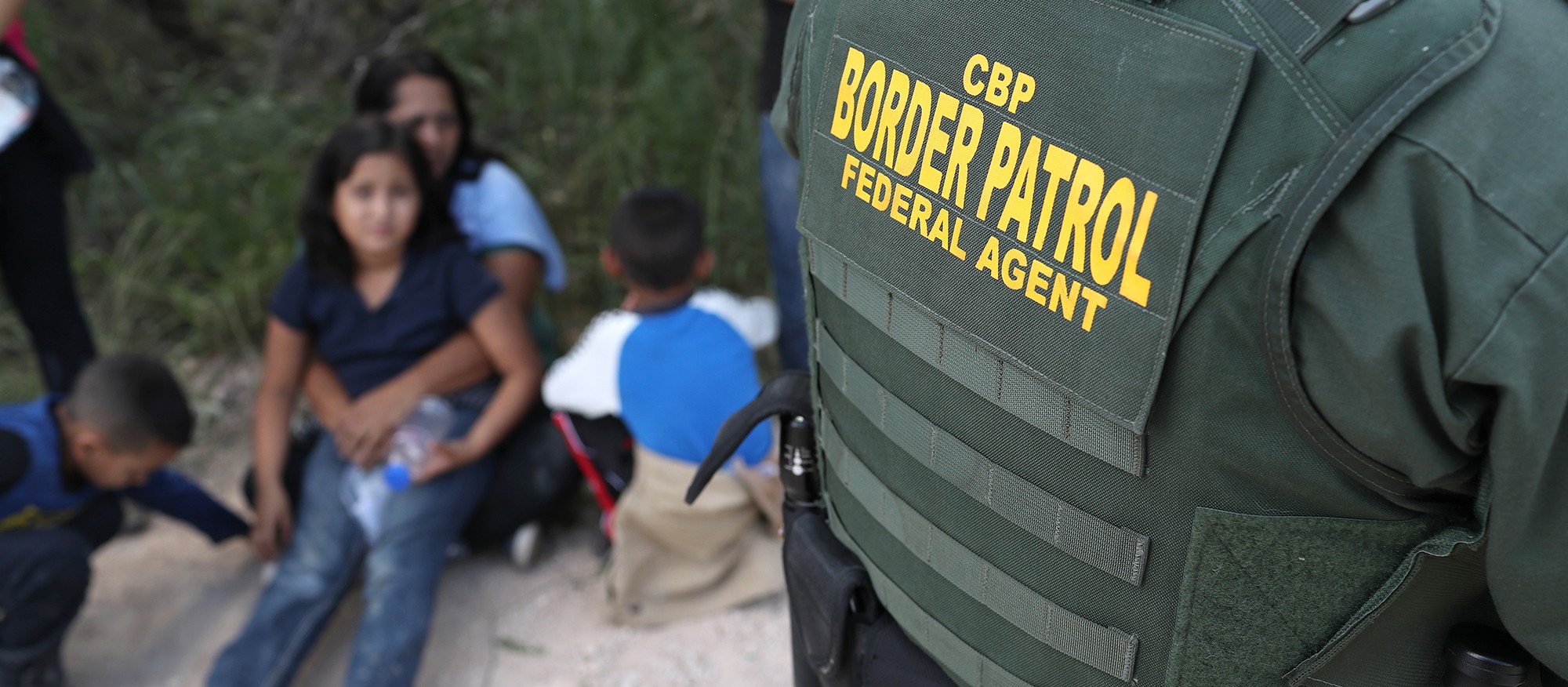
Central American asylum seekers wait as U.S. Border Patrol agents take them into custody on June 12, 2018, near McAllen, Texas. The families were then sent to a U.S. Customs and Border Protection (CBP) processing center for possible separation as part of the Trump administration’s “zero tolerance” policy toward undocumented immigrants. (Photo by John Moore/Getty Images)
Jeff Sessions joins the fray
U.S. Attorney General Jeff Sessions announced the Trump administration’s “zero-tolerance” border policy, saying: “If you cross the border unlawfully … then we will prosecute you. If you smuggle an illegal alien across the border, then we’ll prosecute you. … If you’re smuggling a child, then we’re going to prosecute you, and that child will be separated from you, probably, as required by law.”
But the Department of Justice had no intention of limiting child separation to victims of child trafficking. Just as they had done in El Paso and Yuma, they separated migrant children crossing the border from their own families and dispatched them to shelters.
Another person featured in the film is NBC News correspondent Jacob Soboroff, whose 2020 book Separated: Inside an American Tragedy inspired Morris’ film. Soboroff was one of several journalists to visit a detention facility in McAllen, Texas, where children were being held in cages made of metal fencing.
“Days earlier, at the same facility, federal authorities had snatched a breast-feeding infant from her mother.”
Under the glare of perpetual overhead lights (a known torture technique), the children slept on the floor under thin aluminum blankets. Left without adult help or supervision, older children were forced to change the diapers of the toddlers who had no toys to comfort them. Days earlier, at the same facility, federal authorities had snatched a breast-feeding infant from her mother.
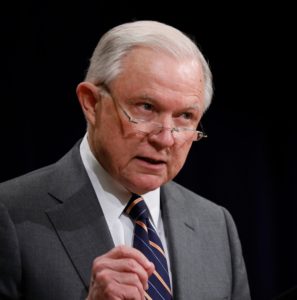
Jeff Sessions
The average age of children seized was 9 years old, and a quarter of those were under the age of 5. Officials promised parents that, if they surrendered their children, the government would reunite them after their trial or deportation; but this never was the plan.
Says Soboroff in an interview with MSNBC, “There was an official list that detailed and chronicled all the children who had been separated in the U.S.… There were conversations about if they would keep the list. They knew what they were doing. They knew what the lack of record keeping meant for these children.”
Because cameras were not allowed in the McAllen shelter, Morris relies on actors to dramatize events, a documentary technique he pioneered in The Thin Blue Line. Gabriela Cartol and Diego Armando Lara Lagunes play a Guatemalan mother and her son, composite characters drawn from Soboroff’s book. Reenactments of the family’s journey to America and suffering in detention humanize the tragedy of the child separation policy, something the Trump administration tried assiduously to avoid by focusing on the need to enforce the law.
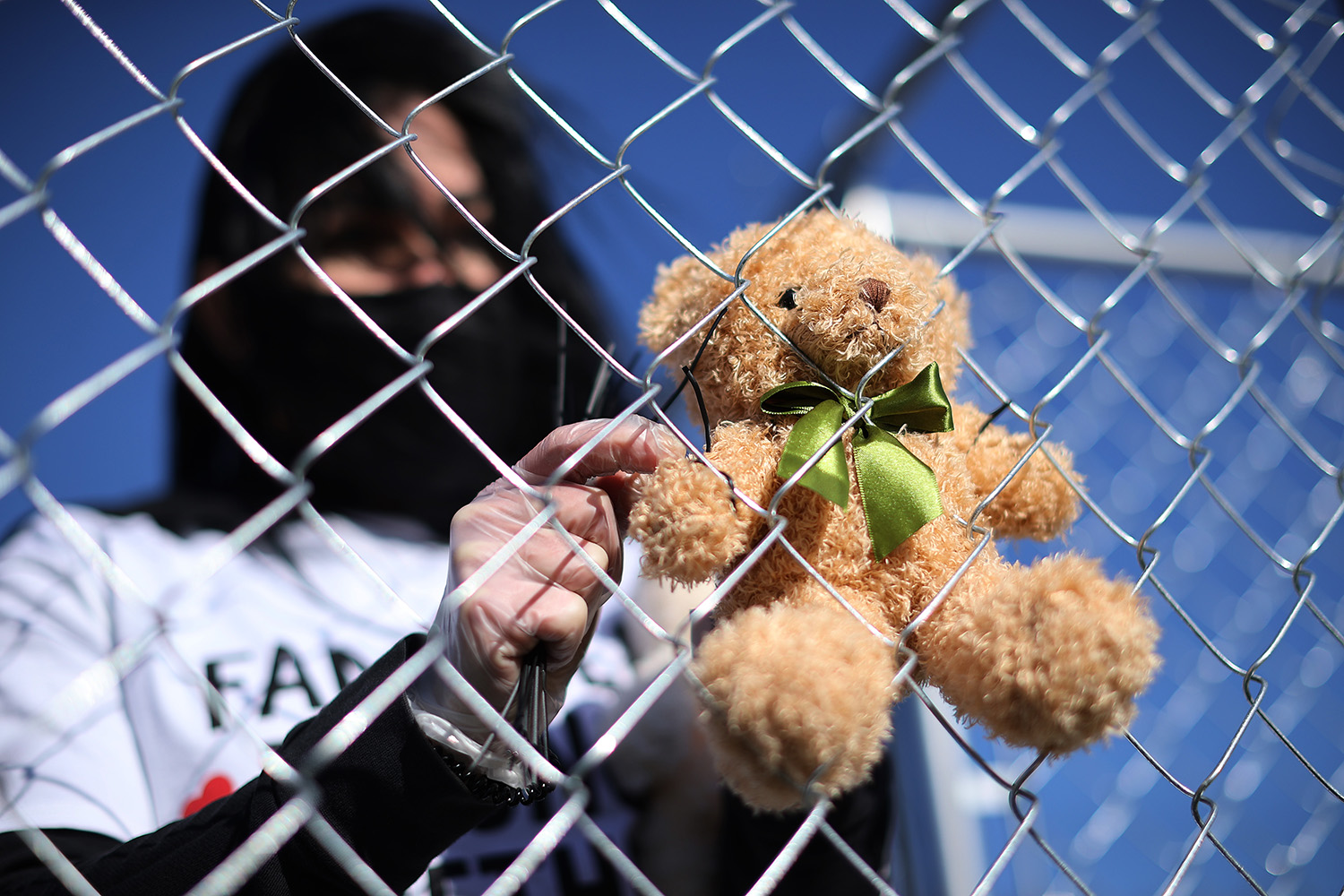
A volunteer with pro-immigration group Families Belong Together attaches one of 600 teddy bears to a chainlink cage representing the children still separated as a result of U.S. immigration policies on the National Mall November 16, 2020, in Washington, D.C. (Photo by Chip Somodevilla/Getty Images)
Even evangelicals objected
Sessions, along with then Press Secretary Sarah Huckabee Sanders, attempted to justify the administration’s family separation policy by citing Paul’s commandment in Romans 13 to “obey the laws of government.” But even Trump’s staunchest evangelical supporters weren’t buying it.
Franklin Graham told CBN the policy was “disgraceful.”
The Southern Baptist Convention unanimously passed a resolution upholding the dignity of immigrants that called for “maintaining the priority of family unity” and stated “any form of nativism, mistreatment or exploitation is inconsistent with the gospel of Jesus Christ.”
Russell Moore and other evangelical leaders signed an open letter to President Trump calling attention to the suffering of children and asking him to reverse the policy.
All the negative publicity eventually forced Trump to sign an executive order on June 20, 2018, ending his child separation policy. He blamed the courts, Democrats and Congress for the crisis, falsely claiming such separations had been happening along the border for 60 years. He said he was the only one who had the “political courage” to finally end it.
Six days later, as a result of an American Civil Liberties Union lawsuit, U.S. District Judge Dana Sabraw issued a nationwide injunction halting family separation at the border. He ordered the Trump administration to reunite families within 30 days, or 14 days for children under 5, and said all children must be permitted to speak with their parents within 10 days.
Because of the administration’s lack of record keeping, they missed the court-appointed deadlines. Trump blamed this on the families themselves for entering the country “illegally.”
But Trump didn’t want to stop
According to former Homeland Security Secretary Kirstjen Nielsen, behind the scenes Trump pushed relentlessly to relaunch what he openly referred to as the “family separation” policy, and for two more years he got his way.
“In January 2020, CBP officers still were separating children from their parents, often for spurious reasons.”
In January 2020, CBP officers still were separating children from their parents, often for spurious reasons. One officer took a sick child from her father, deeming him “neglectful” for waiting until she woke up to change her dirty diaper. Another father was separated from his three daughters because of his HIV diagnosis. Mothers, who themselves had been victims of gang violence, were falsely accused of being gang members. Their children were seized and sent to shelters.
In fact, the Trump administration continued to block the court-ordered reunification of families right up until its final days in January 2021.
All told, seven children died in immigration custody because of Trump’s child separation policy, something that hadn’t happened in more than a decade in the U.S. To date, 4,500 children have filed claims saying they were sexually abused while in detention. And 178 of these claims contain reports of sexual assault, including rape, by adult staff members at the detention centers.
Thousands suffer from post-traumatic stress disorder, anxiety and grief. Despite the efforts of the Biden administration’s Interagency Task Force on Reunification of Families, as of May 2024, 1,400 children still had not been reunited with their parents.
“It’s not a feel-good movie; it’s horrible. It’s a feel bad story. I always cite William Blake’s Songs of Experience: ‘Cruelty has a human face,’” Morris said about the events in Separated.
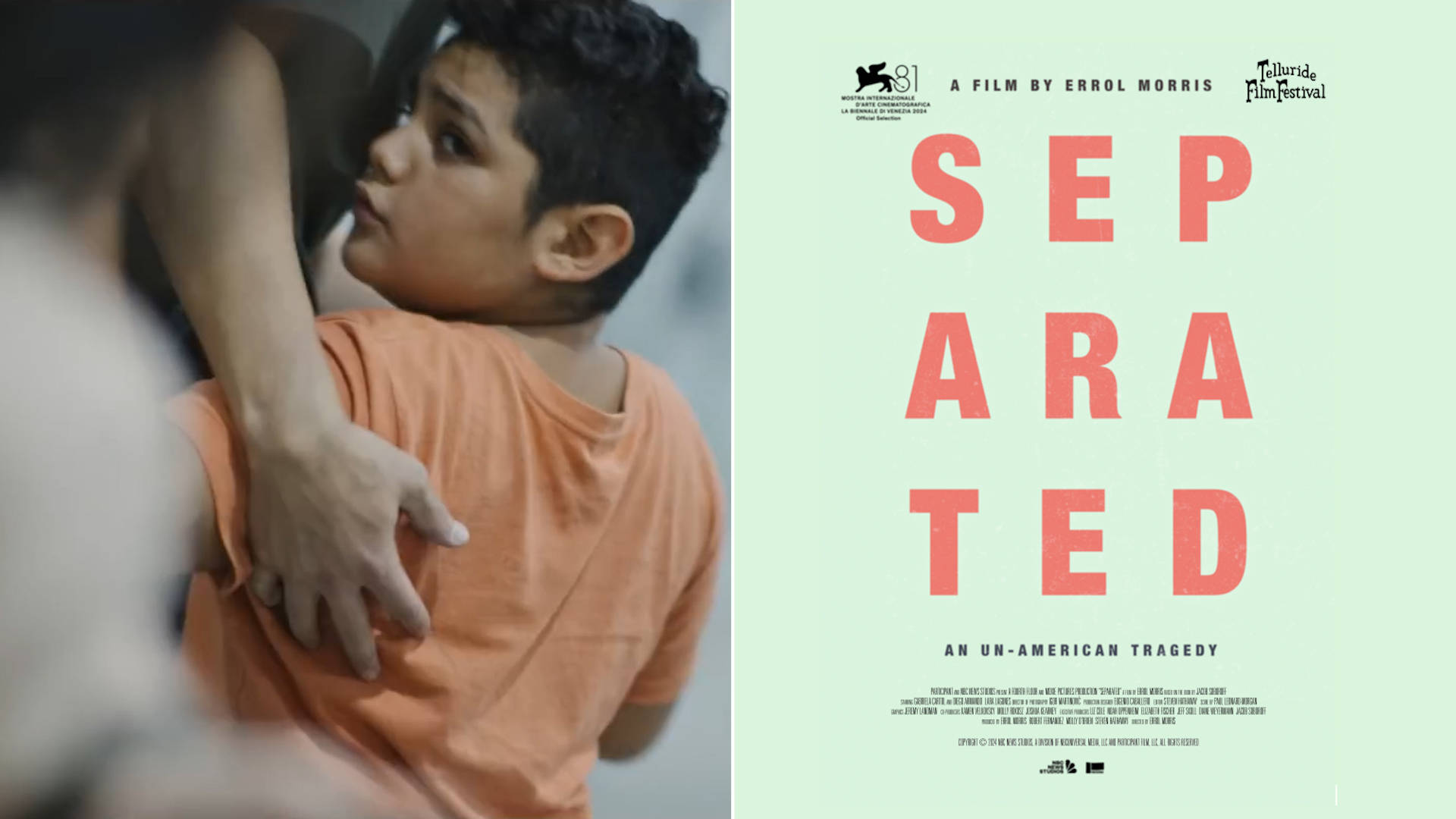
Yes, it could happen again
Could such cruelty happen again? In 2023, Judge Sabraw made his final ruling in the 2018 ACLU lawsuit declaring the U.S. government cannot seize the children of undocumented immigrants who cross the border for the next eight years. Yet, Sabraw’s earlier injunction seemed to have had little effect on the actions of CBP officials, who continued to separate families.
Trump, himself a convicted felon, is not a stickler for the law. According to published reports, Trump once ordered Gen. John Kelly, his chief of staff, to tell Secretary Nielsen: “Round them all up and push them back into Mexico. Who cares about the law?”
In a May 2023 CNN Town Hall, Trump refused to rule out reinstating his family separation policy should he win a second term: “We have to save our country. When you say to a family that if you come we’re going to break you up, they don’t come.”
Trump’s campaign spokeswoman, Karoline Leavitt, has said Trump will “act to secure the southern border and reimplement his prior effective policies to protect our homeland, no matter what challenges are thrown his way or no matter how long it takes.”
“The people who loved this policy are still around and will have major positions … in that administration.”
And there is no reason to think Trump wouldn’t or couldn’t follow through on this intent. If granted a second term, Trump and his team could reinstate a child separation policy simply by making small changes to the one disallowed by the courts. That’s how Miller succeeded with Trump’s Muslim travel ban. The administration enacted slightly different versions of the policy until the Supreme Court finally upheld the third iteration.
Miller believes Trump’s immigration policies were popular with his base, and says the first administration laid the necessary groundwork to implement a border plan that is even harsher and has greater reach than the original.
“It will be really truly horrible the second time around,” Morris said. “The people who loved this policy are still around and will have major positions … in that administration.” Miller himself is rumored to be on the short list for Trumps’ next chief of staff, and he already is at work recruiting MAGA lawyers for Trump’s next DOJ.
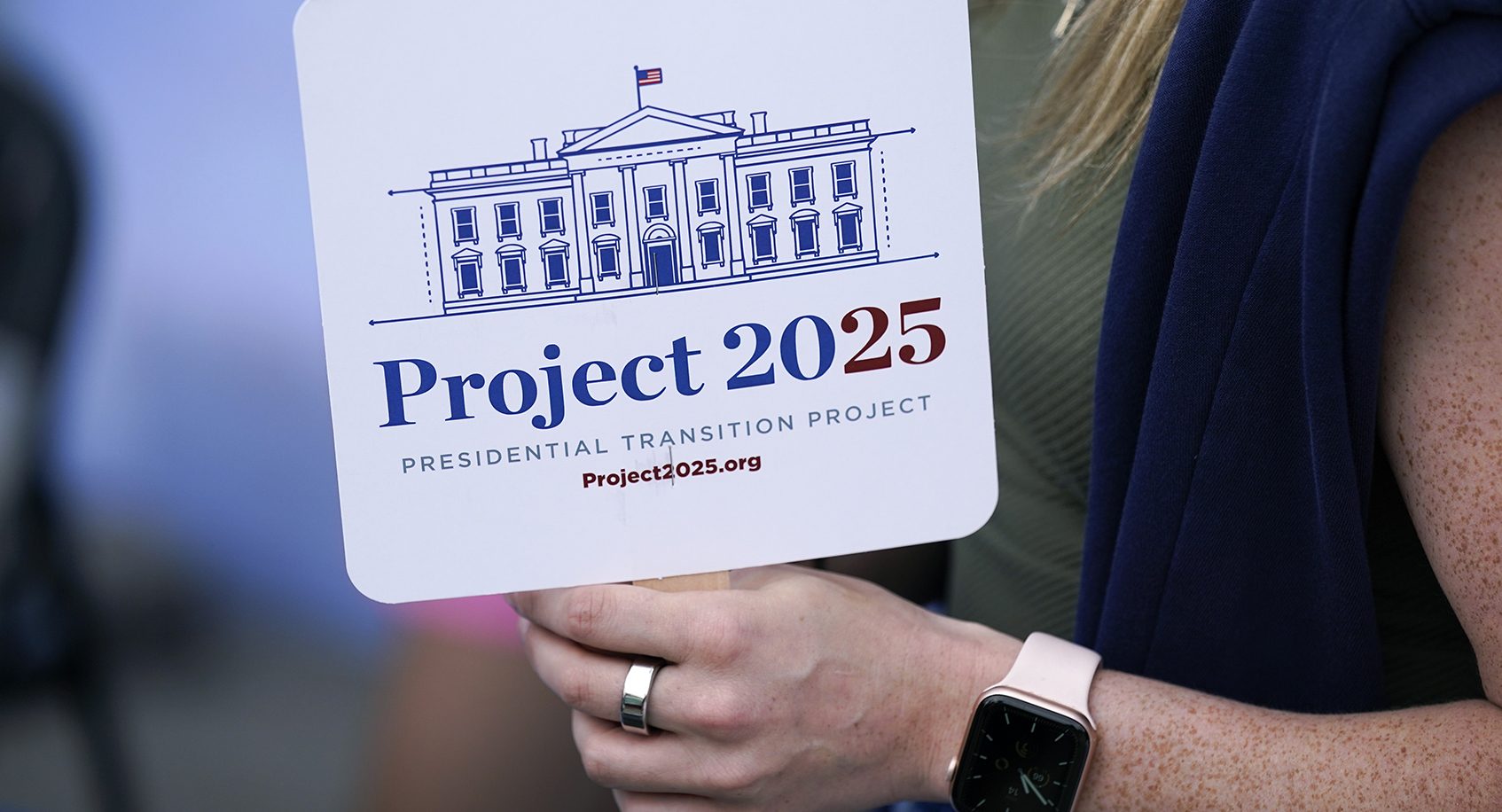
Kristen Eichamer holds a Project 2025 fan in the group’s tent at the Iowa State Fair, Aug. 14, 2023, in Des Moines, Iowa. The Project 2025 effort is being led by the Heritage Foundation think tank. (AP Photo/Charlie Neibergall)
Project 2025
It’s not only the continued presence of figures like Miller that matters. The defection of principled individuals like Gen. Kelly, and the ostracism of others, such as Liz Cheney, from the MAGA movement portends a second Trump administration with fewer restraints and inhibitions than the first. Voices of caution and compassion have been silenced and Christian nationalists like Russ Vought, who wrote the chapter on the presidency for the Heritage Foundation’s Project 2025 Mandate for Leadership, plan to staff the president’s cabinet with like-minded loyalists and reclassify nonpartisan civil servants as political appointees.
It was these career civil servants who obstructed full implementation of the Heritage Foundation’s “2017 Mandate for Leadership” in Trump’s first term. Vought supports the return of the child separation policy, saying, “The decision to defend the rule of law necessitates separation of families — not unlike when a parent commits a crime and goes to jail.” He considers the likes of Franklin Graham “weak” for their earlier criticism of family separation.
If Vought succeeds in creating an all-powerful executive, instead of an expert like Jonathan White heading the Office of Refugee Resettlement, Trump likely would appoint someone from the Heritage Foundation’s Project 2025 Presidential Administrative Academy, a database of zealots training to implement the directives of Project 2025, to lead the ORR and other government agencies.
“Project 2025’s anti-immigration agenda would not just separate immigrant families at the border but potentially all over America.”
Project 2025’s anti-immigration agenda would not just separate immigrant families at the border but potentially all over America. Behind Trump’s blustery rhetoric saying he’ll round up 20 million immigrants, Project 2025 details plans for mass deportations, including those who are in the country legally such as students, workers, refugees, victims of trafficking, unaccompanied minors, DACA program recipients and former military interpreters. Project 2025 would empower Immigration and Customs Enforcement officials to raid hospitals, businesses, worksites, schools and churches to capture migrants and hold them in tent cities along the Texas border.
Immigrants targeted by Trump’s second administration, even those who are married to U.S. citizens and/or have children who are U.S. citizens, could find themselves separated from their children and deported. Trump has further expressed his intent to end birthright citizenship and suspend passports, Social Security numbers and government benefits for the children of undocumented immigrants beginning on day one of his presidency.
Project 2025 further identifies and seeks the removal of legal impediments to these harsh measures. Children caught in the deportation dragnet are currently protected by the Flores Settlement Agreement, which sets standards of care for minors in custody, stating children must be held in the “least restrictive setting appropriate to age and needs.”
The setting must be safe and sanitary with toilets, sinks, drinking water, food, medical attention, supervision by legal representatives and contact with family. The FSA also prohibits the government from holding families with children in detention for more than 20 days.
While the first Trump administration frequently violated the FSA; Project 2025 calls for ending it altogether, to make legally challenging the indefinite detention of migrant children and their parents in court more difficult.
Will face less blowback
If Miller, Vought and their partners succeed in implementing these plans, it is possible public pushback could put the brakes on. However, in a second Trump term, it is less likely the president would face the same blowback from his evangelical Christian supporters as he did in 2018.
That is because support for Trump among evangelicals has “intensified,” says Christian scholar Karen Swallow Prior, beyond what it was in 2016 or 2020. According to Robert P. Jones, the core of Christian support for Trump has moved away from the single issue anti-abortion voters to voters in favor of an aggressive white Christian nationalist approach to governance that is concerned with ending immigration and returning the country to white supremacy.
“Traumatizing migrant children by separating them from their parents may be a tactic they’re willing to tolerate if not embrace to ‘save America.’”
These Christian nationalists believe they are in an apocalyptic battle for the soul of the nation. In their eyes, traumatizing migrant children by separating them from their parents may be a tactic they’re willing to tolerate if not embrace to “save America.”
Naturally, the children who endured the 2018 family separation policy are worried about Trump’s potential return to power and what it could mean for their families. Many of them are still in legal limbo.
On the day Separated opened in theaters, Vice President Kamala Harris held a campaign event with some of those children. Among them was a girl who was separated from her mother for three years and a young man who still struggles with loneliness and anxiety after being held in a shelter as a teenager when his father was deported to Guatemala. Both families were reunited through the work of the Biden-Harris administration.
Nervous about angering Trump, NBC plans to air Separated after the election, on Dec. 7 on MSNBC. Morris hopes voters will take the initiative and see his documentary in theaters before Election Day, Nov. 5, so they can learn the truth about the Trump administration’s child separation policy and what their vote could mean for the future.
“It is not a partisan movie,” Morris said on X. “It’s about a policy that was disgusting and should not be allowed to happen again.”
Kristen Thomason is a freelance writer with a background in media studies and production. She has worked with national and international religious organizations and for public television. Currently based in Scotland, she has organized worship arts at churches in Metro D.C. and Toronto. In addition to writing for Baptist News Global, Kristen blogs on matters of faith and social justice at viaexmachina.com.
Related articles:
As immigration advocates suspected, Title 42 originated with White House, not with CDC
Panelists debate how to ‘normalize’ immigration after ill effects of Trumpism
Second Trump term: ‘We’re gonna put kids in cages. It’s gonna be glorious’ | Analysis by Kristen Thomason

